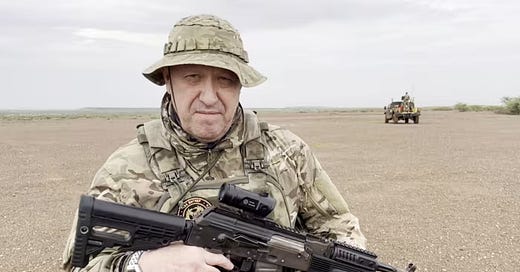Putin's Revenge May Backfire
Putin's assassination of Prigozhin and sacking of Surovikin removed two of his best generals in Ukraine.
The same day that Vladimir Putin apparently killed Wagner Group head Yevgeniy Prigozhin, he also sacked Gen. Sergei Surovikin, perhaps the most competent military leader in Putin’s war on Ukraine. The moves appear to strengthen Putin’s grip on the gangster state he has created in Russia but it may further weaken his defense of the lands he has seized from Ukraine.
Prigozhin was a corrupt, vicious killer and no one should mourn his death. Putin seems to have killed Prigozhin and Dmitry Utkin, the second-in-command of the mercenary Wagner Group, by firing two S-300 interceptors at the plane carrying them and eight others as it headed from Moscow towards St. Petersburg, Prigozhin’s home base. [UPDATE: US intelligence now suspects the plane was destroyed not my missiles but by explosions onboard.] Eyewitnesses reported hearing two explosions before the plane plummeted to the ground. This is the latest in a long string of political opponents that Putin has killed, though none by such a dramatic and overt method.
As if playing a part from The Godfather, Putin was giving a speech to the BRIC summit while his henchmen “settled family business.” Simultaneously with the assassination, Putin fired Surovikin, affectionately known as “General Armageddon” for his brutally effective methods of killing Syrians and suppressing their revolt. Surovikin is credited with reorganizing Russia’s faltering troops in Ukraine, shifting them from failed offensive operations to defensive positioning and constructing the multiple layers of mines and fortifications that are proving so effective in blunting the Ukrainian counter-offensive begun this June. He was one of several senior leaders, now demoted, who were favorable to Prigozhin.
Thus, in one day, Putin removed the only general who had succeeding in any offensive operations in the past year (Wagner forces captured the Ukrainian city of Bakhmut) and the one general who had succeed in implementing a successful defensive strategy.
These actions may be the completion of the purge of dissident military leaders Putin began after Prigozhin’s aborted mutiny of June 23-24. The Institute for the Study of War says that “the assassination of Wagner’s top leadership was likely the final step to eliminate Wagner as an independent organization.” While the Wagner fighters have been the most effective Russian military forces operating in Ukraine (and other areas in the Middle East and Africa), Putin clearly sees their independence as a threat and seeks to absorb them into formal military command structures.
But will it work? While the remaining military leaders will undoubtedly kiss Putin’s ring, the troops may be further demoralized by the sacking and killing of the leaders they most respected. Will Wagner fighters meekly serve their new leaders, or simply leave the field? Will Russian troops be impressed by Putin’s display of dominance or discouraged by the turmoil?
Ukrainian forces continue to make tactically significant gains against the occupying Russians. While not the rapid breakthroughs hoped for in June, Ukraine has seized the initiative in the war and is slowly advancing, overcoming Surovikin’s meticulously constructed defenses to recapture villages and towns nearly every day. Long-range precision attacks continue to destroy vital Russian ammunition depots, logistical hubs and transit routes, such as the strike this week that blew up Russia’s main missile base in Crimea. Ukrainian drones now regularly strike at Russian cities, including six straight days of attacks on Moscow. Ukrainian military leadership also continue to surprise Russia (and Western observers) with unexpected strikes, such as today’s announcement that Ukrainian special operations forces successfully raised the Ukrainian flag in occupied Crimea after a night-time raid.
Still, it is not the dramatic breakthrough of Russian lines that many sought.
Coordinated leaks from the Pentagon to key newspapers over the past two weeks seem to be an effort to shift blame for Ukraine’s slow progress from the US failure to provide Ukraine needed long-range weapons to the claim that Ukraine has ignored the Pentagon’s recommendation for a concentrated assault on the heavily-defended Russian lines. But Ukraine’s leadership is unwilling to take the massive casualties such a strategy entails. After initial thrusts this summer resulted in heavy losses, Ukrainian military leaders have adjusted to the kind of maneuver warfare that they have proved highly skilled at implementing.
Retired Army General Mark Hertling, whose assessments since the beginning of Putin’s invasion have proved sound, made these predictions on August 21, before Putin’s recent moves:
-Ukraine will see significant tactical breakthroughs on 1 or 2 axis of advance in the next few weeks.
-They will continue to advance slowly on Easter and Southeastern fronts…then will see a “surprise” success, likely in Zaporizhzhia Oblast.
-Russian forces won’t be able to reinforce a key area on the “Suvorikin line,” which will contribute to UAF success.
-Support for Putin in Russia will continue to decline & by Christmas he’ll be in dire straits in Moscow.
-Western support for key “ground” support will continue.
I agree with Hertling’s confidence. Ukraine’s victory may take longer than we wish, but with continued and increased Western support they can and will prevail over Putin’s gangster regime.





I’ll look forward to adding this to my must read list with HC Richardson.
Good read, always had a lot of respect for Hertling.